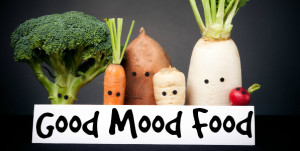How Food Affects Your Moods – Part II
- 19
- Mar
- 2015
- Posted Byadmin
- InDepression, Eating Disorders, Emotional Issues, Individual Concerns, Positive Suggestions
- No Comments.
5. Move to a Mediterranean Diet
The Mediterranean diet is a balanced, healthy eating pattern that includes plenty of fruits, nuts, vegetables, cereals, legumes, and fish — all of which are important sources of nutrients linked to preventing depression.
A recent Spanish study, using data from 4,211 men and 5,459 women, showed that rates of depression tended to increase in men (especially smokers) as folate intake decreased. The same occurred for women (especially among those who smoked or were physically active) but with another B-vitamin: B12. This isn’t the first study to discover an association between these two vitamins and depression.
Researchers wonder whether poor nutrient intake may lead to depression, or whether depression leads people to eat a poor diet. Folate is found in Mediterranean diet staples like legumes, nuts, many fruits, and particularly dark green vegetables. B-12 can be found in all lean and low-fat animal products, such as fish and low-fat dairy products.
6. Get Enough Vitamin D
Vitamin D increases levels of serotonin in the brain but researchers are unsure of the individual differences that determine how much vitamin D is ideal (based on where you live, time of year, skin type, level of sun exposure). Researchers from the University of Toronto noticed that people who were suffering from depression, particularly those with seasonal affective disorder, tended to improve as their vitamin D levels in the body increased over the normal course of a year. Try to get about 600 international units (IU) of vitamin D a day from food if possible.
7. Select Selenium-Rich Foods
Selenium supplementation of 200 micrograms a day for seven weeks improved mild and moderate depression in 16 elderly participants, according to a small study from Texas Tech University. Previous studies have also reported an association between low selenium intakes and poorer moods.
More studies are needed, but it can’t hurt to make sure you’re eating foods that help you meet the Dietary Reference Intake for selenium (55 micrograms a day). It’s possible to ingest toxic doses of selenium, but this is unlikely if you’re getting it from foods rather than supplements.
Foods rich in selenium are foods we should be eating anyway such as:
- Seafood (oysters, clams, sardines, crab, saltwater fish and freshwater fish)
- Nuts and seeds (particularly Brazil nuts)
- Lean meat (lean pork and beef, skinless chicken and turkey)
- Whole grains (whole-grain pasta, brown rice, oatmeal, etc.)
- Beans/legumes
- Low-fat dairy products
8. Don’t Overdo Caffeine
In people with sensitivity, caffeine may exacerbate depression. (And if caffeine keeps you awake at night, this could certainly affect your mood the next day.) Those at risk could try limiting or eliminating caffeine for a month or so to see if it improves mood.
Source: webmd.com
Receive My Newsletter
Categories
- Abuse
- Anxiety & Panic
- Comics
- Dating
- Depression
- Eating Disorders
- Emotional Issues
- Family Issues
- Happiness
- Individual Concerns
- Marriage / Relationships
- Mental Illness
- Parenting
- Personality
- Positive Suggestions
- Stress
- Suicide
- Teenagers



